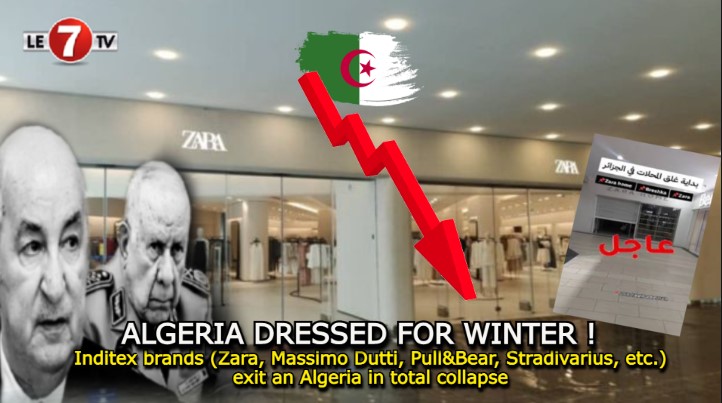Inditex brands (Zara, Massimo Dutti, Pull&Bear, Stradivarius, etc.) exit an Algeria in total collapse

The abrupt departure of the Spanish retail giant Inditex (Zara, Massimo Dutti, Pull&Bear, Stradivarius, etc.) from Algerian soil stands as a damning indictment of an economy plagued by corruption and the mismanagement of the ruling military junta. A disastrous governance, marked by absurd trade restrictions and suffocating taxation, has hastened the closure of these iconic international fashion brands, leaving the country to grapple with an alarming economic reality.
A departure that unveils the regime’s deep flaws
Over the past few days, the once-sparkling displays of Zara and Pull&Bear stores have turned eerily empty. While Reuters has confirmed the closure of franchised outlets operated by the Emirati company Daher, Inditex’s regional partner, no official statement has clarified this drastic decision. However, behind the apparent silence, the reasons for this withdrawal are clear: a chaotic economic policy incapable of sustaining a conducive environment for foreign investors.
Media manipulations as a smokescreen
Amid public outrage and growing questions among Algerians, state media have predictably sought to downplay the event. These mouthpieces of a regime losing its credibility claim that the closures are part of Inditex’s global restructuring program—a baseless assertion. In reality, this restructuring, initiated in 2020 to address pandemic challenges, concluded in 2024.
Worse still, Inditex is currently experiencing extraordinary financial health. In 2023, the group recorded a net profit of €5.38 billion, a 30% increase from the previous year’s €4.13 billion. It is, therefore, absurd to attribute this decision to internal difficulties within the company.
An economy hostile to investors
The true reason behind this withdrawal lies in the Algerian junta’s disastrous economic policies. Absurd import restrictions, prohibitive taxes, and an oppressive bureaucracy have not only stifled the activities of local franchises but also discouraged any prospects for investment.
The project announced in April 2023 by Commerce Minister Tayeb Zitouni, aiming to produce Inditex items at the Algerian-Turkish textile factory in Relizane, now seems derailed. This closure sends a catastrophic signal to international investors, reaffirming that Algeria is a treacherous terrain for business.
A blow to Algerian consumers
For Algerian consumers, already deprived of numerous products due to import restrictions, this new closure is another slap in the face. These brands represented a link to the global market, offering quality products at competitive prices. Now, Algerians are forced to rely on a local market that is inadequate, often characterized by mediocre quality and exorbitant prices.
Systemic corruption at the core of the collapse
The fundamental problem remains the endemic corruption plaguing the regime. Military elites, who monopolize the country’s resources, have repeatedly demonstrated their inability to create a stable and predictable economic climate. The closure of Inditex stores is just one of many examples of a system that sacrifices public interest on the altar of private gains and power struggles.
Algeria and its bleak future
Inditex’s departure should serve as a wake-up call for Algerian officials about the urgent need for profound reforms in their economic model. Without genuine openness to foreign investment, a rationalized tax system, and a relentless fight against corruption, Algeria will continue to miss critical opportunities.
However, as long as power remains in the hands of a military elite disconnected from economic realities, such reforms will remain a distant dream. For now, Algerians bear the heavy cost of disastrous governance, condemned to witness their country sink further into economic isolation and social despair.
By Abderrazzak Boussaid / Le7tv





